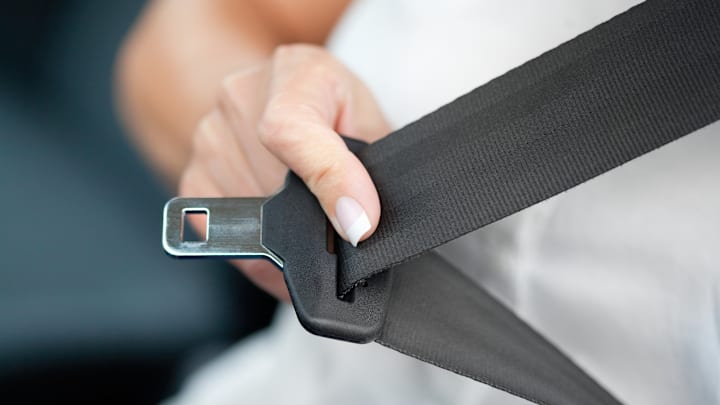Even if you don’t use them, the under-looked features of your car each serve a practical purpose. The grab handle above the door makes getting in and out easy, and the symbols on your dashboard clue you in to the health of your vehicle. The extra loop of fabric on your seatbelt is more enigmatic, but just as important. Though hopefully you’ll never need it, it’s there to prevent injury or even death in the event of a crash.
According to Reader’s Digest, the fold of excess fabric you can find beneath the buckle of many passenger seatbelts is known as the energy management loop. Under ideal circumstances it doesn’t do much, but in a serious collision it provides an additional layer of safety.
If the passenger’s body flings forward with enough force to damage the seatbelt, the stitched-up loop is designed to rip open. Once it unfurls, the rider is afforded several more inches of seatbelt to protect them. That means they effectively would need to tear through two layers of fabric before flying from their seat.
The feature has a less dramatic function as well. When no one is using the seatbelt, it keeps the buckle from sliding to the floor or the car. Not every car uses energy management loops, and plastic buttons are sometimes added to seatbelts to keep the buckles in place instead. Even when cars do have seatbelt loops for passengers, you will always see buttons on the driver’s seatbelt instead. That’s because the safety feature is less safe when you're behind the wheel.
Hitting the steering wheel at high speed is a common source of injury for motorists in a crash. In worst case scenarios, keeping the driver’s body away from the wheel with the airbag and seatbelt is a priority for vehicle designers. Instead of protecting them, the surplus room granted by the seatbelt failsafe could bring them closer to a concussion.
If you drive your car everyday, you can benefit from learning more about its features. Like why the back windows don’t roll all the way down.
[h/t Reader's Digest]
